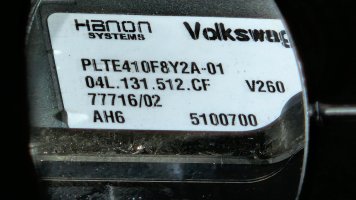J
Jon A
Hi Perfectos,The New type and old Type EGR pipes are shown in this thread (photos compared side by side) , also pictures showing the method of EGR flush , chemical used and equipment that a dealer would use to flush an EGR valve, since having this work done I have had no further issues.
I did turn off coasting immediately after having this work done , I'm now on 50+k miles no further issues.

EGR - Insufficient Flow - £1700
Hi Folks looking for some advise, I have a 2014 180 biturbo Cali (47,000 mile) and the engine warning light illuminated. Engine code CFC Took to the my local commercial VW garage in Edinburgh (where I bought it) and was told the diagnosis was "Insufficient Flow" in the EGR. Have been quoted...vwcaliforniaclub.com
I'll caveat the following with, this is what I've understood (but may well be wrong!):
I think the newer pipes you refer to were slightly revised versions that helped prevent the pipes failing at their weaker point in their bend. Let's called this a "type1 failure - of the plumbing to/from the EGR"
But these revised pipes still connected the same elements together. My van was one of the last T6.0 and I "think" should have already been built with these better connecting pipes
Triplebee's interesting insight is that from 2020/ T6.1 the pipes connect at a different point , which is AFTER the DFP now. Which reduces the amount of "soot/crud" going into through the EGR heat exchanger, reducing the chances of the internal honeycomb structure becoming blocked and so becomes unable to produce enough flow to do it's job (let's call that type 2 failure!)
As it happens my EGR wasn't blocked up, rather the internal barrier between hot exhaust gas and circulating coolant failed, so it was losing coolant into the cylinders. So a different problem. Type 3 - internal barrier breakdown. I'm wondering if the new plumbing layout would help with this type of fail also


















